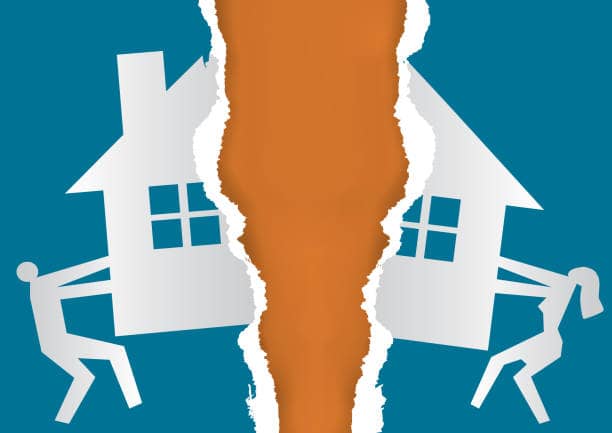Who Gets The House in a Divorce California Guide
Who gets the house in a divorce depends on the situation but is mainly governed by the ‘community property’ principle in California.
We know… you just want a simple answer that says, “you do”, right?
This is a question we get asked time and time again, so it’s about time we lift the lid on the information.
We’ll explore factors influencing the court’s decision, provide practical advice on negotiating an equitable agreement, and shed light on the legal intricacies surrounding this emotionally charged issue.
Table of Contents
Who gets the house in a divorce in California?
In the event of a disagreement over the house during a divorce in California, the property division laws of the state apply. In simple terms: if it’s separate property, the owning spouse keeps it. If it’s community or commingled property, it must be split between the spouses.
To understand this further, we need to delve deeper into what constitutes separate, community, and commingling property in California:
- Separate property: Refers to assets acquired before marriage, gifts, and inheritances before they lived in the house together or before the house was purchased.
- Community property: Encompasses all assets and earnings obtained during the marriage.
- Commingled property: A mix of separate and community property, often making its division of property in the event of a complex divorce.
With the above classifications in mind, though, what about moving out?
Who moves out during divorce?
Deciding who moves out during a divorce is generally a voluntary choice and not a legal requirement in a divorce case, unless a court order specifies otherwise. In this case, leaving due to a court order does not constitute abandonment or place blame on the departing spouse in any way.
With that said, the decision on who should move out in a divorce can depend on several factors, such as:
- The best interests of children involved
- Potential financial implications, and
- Any documented history of domestic violence
Cases involving children
California courts generally prefer to avoid disrupting the children’s routines. Therefore, the parent who is awarded primary custody in a divorce settlement may be more likely to stay in the residence. In this case, their former spouse should then move out of the home during a divorce.
Financial implications
Can one spouse afford to maintain the home on a single income? Might it be more equitable to sell the property and divide the proceeds? These are some questions that can influence the decision.
Toxic or abusive relationship
It might be best for the victim to leave the home for their safety, even if it’s legally their right to stay in the family home. Remember, this does not constitute abandonment, and it should not negatively impact their role in the divorce proceedings.
What happens if the husband or wife moved out before divorce in California?
If a spouse leaves the house before divorce in California, it doesn’t necessarily affect property division. However, if the spouse who moved out still contributes to house-related expenses, they may be entitled to reimbursement or credit, unless agreed otherwise.
Moving out beforehand can have implications on child custody and spousal support, though. Courts might presume that the living arrangements during the separation period were working out well, especially for the children, which could influence custody decision.
In terms of spousal support, the spouse who moved out might find themselves obliged to help cover the costs of the marital home, even if they are also paying for their new accommodation.
Crucially, who leaves the house in a divorce should be a well-considered decision, ideally discussed with a divorce attorney. Understanding the potential outcomes can help both parties navigate the process and reach an agreement that respects everyone’s rights and interests.
What happens to the house in a divorce?
The resolution of property, especially a shared family home, is among the most critical decisions in a divorce. The future of a house in a California divorce can take several paths, each with its own implications and considerations.
Here are the common options available to divorcing couples:
One spouse buys the other out
A spouse might decide to buy out the other’s interest when they want to keep the house, and the other is willing to relinquish their rights to it.
The spouse who gets to keep the house will need to pay the selling spouse for their share of the home’s equity. The equity is typically calculated by taking the current market value of the house and subtracting any outstanding mortgage or home equity loans.
Bear in mind, if you opt for a buyout, it’s crucial to get a proper appraisal to ascertain the home’s value. Also, the buying spouse must ensure they have the financial capability to take over the mortgage payments solely.
In this arrangement, the selling spouse can secure some financial cushion, while the buying spouse can stay on in the house, which can be particularly beneficial if there are children involved.
However, a buyout does come with its challenges. The buying spouse may struggle to finance the buyout or refinance the mortgage. Additionally, the selling spouse may not be satisfied with the buyout amount, leading to further disputes.
Retain joint ownership
Retaining joint ownership is especially a favorable option when the children are still young and the parents want to keep their lives as undisturbed as possible. It requires immense cooperation and mutual respect as they make decisions together about upkeep, expenses, and eventual sale.
In this situation, both spouses share house responsibilities, including:
- Mortgage payments
- Maintenance costs, and
- Property taxes.
Joint ownership can also be financially beneficial, enabling both parties to profit from potential property value appreciation over time.
However, maintaining joint ownership post-divorce can have its pitfalls. For instance, there could be disagreements about the sharing of ongoing house-related costs or decisions about when and how to sell the house later. For example, one spouse may wish to move on earlier than the other, which can lead to dispute and potential legal costs.
Additionally, keeping a joint mortgage could limit both parties’ ability to secure further borrowing for their individual futures.
Rent out the house
Doing this can nullify any potential financial burdens from other options, especially in uncertain economic times. Renting allows both parties to share the rental income and benefit from any increase in the property’s value.
When deciding to rent, consider:
- Local rental market
- Potential income
- Ongoing costs
- Responsibilities of being a landlord, and
- How responsibilities and profits will be shared between spouses.
However, it’s important to note that this approach relies on ongoing communication and cooperation between ex-spouses, which may not be suitable for everyone. Another drawback is the possibility of periods without tenants (and no rental income).
Sell the home to a third party
In most cases, the most sensible option for divorcing couples is to sell their shared home to home buying companies, like SoCal Home Buyers. This not only provides financial liberation but also helps to cut ties with the past and start afresh.
If you feel this is an option for you, get started with us in just four easy steps:
- Contact us: You can reach us at 951-331-3844 or simply fill out the short form below to schedule a consultation. We’re here to offer a fair cash offer for your home.
- Discuss your property: After receiving your call or form, we’ll get in touch promptly to discuss your property in more detail and schedule a one-time inspection.
- Get a cash offer: At the time of the inspection, our in-house inspector will quote you a fair, no-obligation cash offer. If it suits you, consider your home sold!
- Choose your closing date: Once you agree to the offer, simply choose your preferred closing date and leave the rest to us. You can opt for payment via check or money order.
By selling a house during divorce in California, former spouses can bypass the hassles of traditional selling, ensuring a quick, efficient, and stress-free process. It simply doesn’t get any easier than this.
So, don’t wait, take the first step towards a hassle-free home-selling experience now!
Who gets the house after divorce? Our key takeaways
Determining who gets the house in a divorce can be a daunting task. However, understanding the various options can help you make an informed decision that best suits your situation.
It’s essential to remember that each choice has its pros and cons, and what works for one couple might not work for another. The ultimate aim is to reach a resolution that respects both parties’ rights and interests, with the least amount of disruption possible.
If the decision is to sell, choosing the right buyer makes the process easier and less stressful. At SoCal Home Buyers, we buy houses in California through a simple, and hassle-free solution. No repairs, no listings, no divorce lawyers from a law group, and no waiting on a client. Just a fair cash offer for your home, on your timeline.
Our team’s knowledge and experience allow us to navigate the intricacies of property sales during divorce proceedings, ensuring a smooth transaction for all parties involved. With us, you get the peace of mind that comes with a quick, fair, and uncomplicated home sale.










